Split Gill Benefits (Schizophyllum commune)
Split Gill (Schizophyllum commune) is an edible mushroom and medicinal mushroom.

Supports Gut Health
Split Gill mushrooms carry promising potential for gut health enhancement, attributed to the presence of bioactive compounds such as β-glucans. Incorporation of these mushrooms into the diet has been shown to improve mucin production and expand the population of goblet cells, which contributes to a more robust mucin layer in the intestine, essential for smooth digestion and barrier protection.
Apart from improving the structural integrity of the gut lining, these β-glucans from Split Gill mushrooms significantly modify the gut microbiota, favoring the growth of beneficial bacteria while reducing populations of deleterious microbes. This shift is coupled with the increased production of short-chain fatty acids, compounds known for their protective effects against disorders like obesity and diabetes.
Through the lens of prebiotic activity, recent studies from Thailand highlight the role of naturally derived compounds, including those from mushrooms, in promoting gut health. Split Gill-derived β-glucans stand alongside other prebiotics such as oligosaccharides from fruits and vegetables, emphasizing their prebiotic potential and the subsequent need for clinical substantiation of these health claims.
In conclusion, the Split Gill mushroom may contribute to a healthier gut environment and protect against common digestive and metabolic ailments, enhancing the overall well-being.
Learn about mushrooms with gut health benefits.
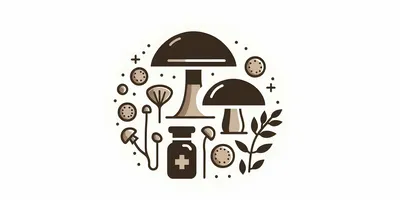
Antioxidant Benefits
One of the remarkable attributes of Split Gill mushrooms is their rich content of natural polysaccharides, substances that have been extensively researched for their antioxidant benefits. Antioxidants are critical in neutralizing harmful free radicals in the body, which can lead to oxidative stress, cellular damage, and various chronic diseases.
Through vigorous structural analyses, it has been identified that the polysaccharides derived from Split Gill and other mushrooms contain properties that contribute significantly to their antioxidant capacity. These include a variety of molecular structures, such as β-glucans, which are prominently recognized for their health-promoting potential. The structural features of these polysaccharides— including molecular mass, monosaccharide composition, and branching patterns — are crucial determinants of their functionality in preventing oxidative damage.
Regular intake of Split Gill mushrooms can bolster the body's antioxidant defenses, helping to maintain cellular integrity against environmental and metabolic aggressors. Not only do these antioxidants aid in protecting the body on a cellular level, but they are also pivotal in the prevention of chronic conditions associated with oxidative stress, supporting overall health and well-being.
Learn about mushrooms with antioxidant benefits.

Supports Mental Health
The recognition of mental health as a critical component of overall well-being has led researchers to explore the therapeutic potential of various natural remedies, including mushrooms like Split Gill. A recent study by Nguyen et al. highlights not a direct effect of Split Gill, but the importance of comprehensive interventions in improving mental health outcomes. This type of research underlines the necessity of holistic approaches to mental wellness, where Split Gill could play a role as part of a broader regime of health and nutrition practices aimed at enhancing mental health.
The intricate link between dietary choices and mental health suggests that incorporating Split Gill into one's diet may contribute to a more balanced and holistic lifestyle. The polysaccharides and other bioactive compounds found in mushrooms are theorized to interact with gut microbiota, modulate inflammation, and impact the neuroendocrine system—all of which are pathways implicated in mental health.
While the study by Nguyen et al. does not explore Split Gill specifically, it serves as a critical reminder of the multifaceted nature of health interventions. As further research emerges, it may provide insights into how Split Gill, among other dietary interventions, could be integrated into multi-component strategies like the Learning Clubs program to support maternal mental health and overall cognitive wellbeing. For a detailed understanding of the current approaches to mental health interventions, particularly in the context of economic evaluations, the protocol outlined by Nguyen et al. offers valuable perspectives which can be assessed here.
Learn about mushrooms with mental health benefits.

Antimicrobial Properties
Split Gill mushrooms have demonstrated promising antimicrobial potential, expanding our arsenal against infections. A study exploring the diversity and antimicrobial activity of intestinal fungi from coral reef fish indicated that a significant proportion of fungal isolates, among which Split Gill was present, showed antimicrobial properties. These fungi were effective against at least one marine pathogen, suggesting their capability in naturally combating microbial threats.
Additionally, a thorough investigation into the structural features and health properties of polysaccharides in mushrooms has confirmed that these compounds, abundant in Split Gill mushrooms, contribute to their antimicrobial prowess. The structural complexity and branching patterns of the polysaccharides, such as β-glucans, are key factors in their ability to interfere with the growth and survival of harmful microorganisms.
This evidence supports the potential of Split Gill mushroom extracts as natural antimicrobial agents, offering alternative measures for preventing and treating infections, particularly those from drug-resistant strains. These findings pave the way for the development of bioactive products utilizing the antimicrobial properties inherent in this mushroom.
Learn about mushrooms with antimicrobial benefits.

Antiviral Benefits of Split Gill Mushrooms
Split Gill mushrooms have shown promising antiviral properties, particularly in the context of the recent global health challenges. One significant area of interest is the mushroom's effect on viruses that access host cells via specific protein receptors. A recent study found that components derived from Split Gill mushrooms, including adenosine, significantly reduce the expression of ACE2 and TMPRSS2, which are crucial for the entry of SARS-CoV-2, the virus responsible for COVID-19. The research conducted both in vitro and in vivo suggests the potential of Split Gill in contributing to therapeutic strategies against SARS-CoV-2 infection.
Furthermore, the diverse and potent polysaccharides found in mushrooms, including Split Gill, are known for their health-promoting qualities. These polysaccharides, and in particular β-glucans, are not only pivotal for immunomodulation but have also exhibited antiviral effects. The structural features of these polysaccharides, which include molecular mass, monosaccharide composition, and branching patterns, are key to their biological activity. By potentially disrupting the mechanisms through which viruses infect host cells, Split Gill mushrooms emerge as a valuable functional food in the preventive health sector.
The extensive research offers a scientific basis for the exploration of Split Gill mushrooms as a natural antiviral agent, underscoring its importance in the fight against infectious diseases and in supporting overall immune health.
Learn about mushrooms with antiviral benefits.
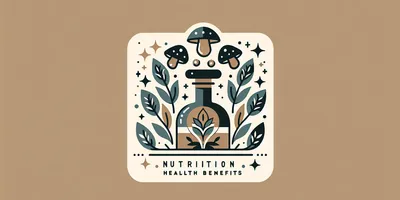
Nutritional Support for Gut Health
Split Gill mushrooms are a promising source of nourishment for the digestive system. Rich in valuable nutrients, they contribute to maintaining a healthy gut environment. These mushrooms contain essential fibers that act as prebiotics, substances that support the proliferation of beneficial gut bacteria. The significance of prebiotics for gut health has been explored thoroughly in recent research from Thailand, where a variety of natural sources including mushrooms have been investigated for their prebiotic potential.
Specifically, Split Gill mushrooms are an excellent source of natural β-glucans, a type of polysaccharide that aids in the nourishment of the gut's microbial flora. According to research, β-glucans from mushrooms like Split Gill can have a significant impact on gut health, offering a natural and effective way to enhance intestinal wellbeing.
The incorporation of these mushrooms into the diet can lead to prebiotic benefits that have been validated in clinical trials. For example, improved gut health was observed in studies where inulin, a well-known prebiotic fiber, was infused in a variety of food products. The findings from such research underscore the potential of Split Gill mushrooms as a valuable component of nutraceuticals and functional foods aimed at enhancing gastrointestinal health.
Learn about mushrooms with nutrition benefits.

Anticancer Benefits of Split Gill
The presence of complex polysaccharides in Split Gill has been the focal point of research due to their significant anticancer activity. These compounds not only engage in immunomodulation but also demonstrate a direct influence on the suppression of cancerous cells. The unique structural characteristics of polysaccharides, particularly beta-glucans, are paramount to their efficacy as they can activate various cellular responses intrinsic to the cancer defense mechanism.
According to research, these polysaccharides exert an anticancer effect by potentially preventing tumor formation and growth. By targeting different stages of cancer development, they interfere with the proliferation of malignant cells and may aid in the activation of the body's natural defensive reactions, such as promoting the activity of immune effector cells. It is this unique ability to modulate the immune system that underscores the anticancer properties of mushroom-derived compounds.
Studies highlight the necessity of detailed structural analysis of mushroom polysaccharides in understanding their biological activities. The methods of extraction and isolation are pivotal, as they retain the molecular integrity that determines their interaction with cancer cells and immuno-eliciting properties. This groundbreaking research leads to a more profound comprehension of how Split Gill can be incorporated into therapeutics aimed at combating cancer.
Learn about mushrooms with anticancer benefits.
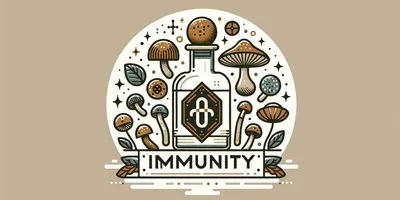
Supports Gut Health through Prebiotics
Split Gill mushrooms are recognized for their role in promoting gut health, largely due to their prebiotic content. Prebiotics such as oligosaccharides are vital non-digestible fibers that encourage the proliferation of beneficial bacteria in the digestive system. A study conducted by Wichienchot and colleagues in Thailand has highlighted the health benefits of oligosaccharides extracted from natural sources, including specific types of mushrooms like Split Gill.
The research investigated the potential of various fruits, vegetables, and agricultural by-products as sources of prebiotics. It mentioned mushrooms for their β-glucan content—biologically active compounds that contribute significantly to gut health by fostering a favorable environment for gut microflora.
In addition to supporting the and development of a beneficial microbiome, Split Gill’s prebiotic properties may enhance overall digestive health and improve the immune system’s function. By focusing on plant-based sources such as mushrooms, the study reiterates the significance of including naturally derived prebiotics in our diet for maintaining gastrointestinal well-being.
Learn about mushrooms with Immunity benefits.

Anti-obesity Benefits
Continuing our exploration of Split Gill mushroom's health benefits, recent research has shed light on its potential role in managing obesity. A study focused on Schizophyllum commune-derived β-glucan has yielded promising results in the context of improving intestinal health and offering protective effects against metabolic disorders. β-glucans from the Split Gill mushroom were shown to enhance the production of mucin and proliferation of goblet cells, ultimately strengthening the intestinal mucin layer, which is an integral part of a healthy gut.
This particular carbohydrate compound has been observed to not only favorably alter gut microbiota—boosting beneficial bacteria and inhibiting harmful ones—but also to increase the population of bacteria that produce short chain fatty acids, compounds known for supporting overall gut health. The study's outcomes suggested an interesting twist in the battle against obesity: β-glucan from Split Gill mushrooms may reduce obesity-related markers and help maintain lower serum glucose levels, suggesting a potential protective effect against diabetes. Though it did not significantly impact intestinal transit rates under normal conditions, under obesity-induced conditions, it exhibited notable health advantages.
While these findings are preliminary, they represent an exciting avenue for future research into the role of Split Gill mushroom as a natural measure against obesity and its related complications, including diabetes and inflammatory bowel diseases. As we continue to search for sustainable and healthful dietary interventions, the Split Gill mushroom's β-glucan proves to be a prospective ally in improving gut health and mitigating the risk factors associated with excess weight.
Learn about mushrooms with Anti-obesity benefits.

Enhances Immune Function
Split Gill mushrooms are recognized for their rich content of natural compounds that can significantly enhance immune function. One of the most potent elements found within these mushrooms are polysaccharides, which have been extensively studied for their health-promoting properties.
Research has revealed that these polysaccharides, particularly β-glucans, are powerful immunomodulators. The active constituents in Split Gill mushrooms have the ability to influence immune system regulation, which can lead to various health benefits. For instance, they can trigger an immune response when necessary while also being capable of suppressing hyperactive immune function to prevent excessive inflammation.
This balance is critical for maintaining a healthy immune system capable of warding off infections and potentially even fighting cancerous cells. The role of mushroom-derived polysaccharides in immunomodulation has been backed by scientific studies, with Split Gill mushrooms being one of the fungi that contain these beneficial compounds.
Moreover, the structural complexity of these polysaccharides, which includes their molecular mass, monosaccharide composition, and branching patterns, has been closely associated with their biological activity. Due to the intricate relationship between structure and function, the methods of extraction and purification of these polysaccharides are crucial in ensuring their efficacy. The research paper exploring these structural features provides insights into how Split Gill mushrooms contribute to a healthy immune system through their sophisticated natural components.
Learn about mushrooms with immune boost benefits.

Improved Care Benefits
The Split Gill mushroom has been studied for its potential impacts on healthcare provision, particularly with regard to Methadone Maintenance Treatment (MMT) services. One key study focused on the knowledge of commune health workers (CHWs) in Vietnam, assessing their understanding of MMT and the challenges they face in delivering these services. Despite the majority of CHWs displaying a reasonable knowledge level, with an average score of 8.2 out of 12 on a true or false questionnaire, there remain significant misconceptions about MMT that could affect care quality.
Furthermore, the study highlighted the CHWs' perceived difficulties in engaging with and treating people who use drugs (PWUD). This is a critical aspect to consider for enhancing the effectiveness of decentralized MMT services, and by extension, healthcare outcomes. Experience with PWUD and the age of the CHWs were found to significantly influence their knowledge level and perceived difficulties. This suggests that tailored training initiatives are necessary to improve CHW's competencies and confidence in administering MMT, ensuring that patients receive the improved care they need in line with the therapeutic benefits Split Gill may offer.
Learn about mushrooms with Improved care benefits.

Supports Anti-Diabetic Potential
Evidence suggests that the dietary fiber β-glucan derived from Split Gill mushrooms can have a remarkable impact on maintaining blood sugar levels. In a research study, mice that were supplemented with β-glucan from Split Gill exhibited lower serum glucose levels. This implies a potential protective effect against diabetes through modulatory impacts on metabolism and glucose homeostasis.
The study also highlighted the influence of β-glucan on the makeup of the gut microbiota. The presence of beneficial bacteria was amplified, which is associated with improved metabolic health and potentially reducing risks associated with metabolic disorders such as obesity and diabetes. Moreover, β-glucan was shown to bolster mucin production in the intestines, offering a protective effect against constipation—one of the common ailments faced by those with diabetes.
The study's findings suggest that incorporating Split Gill mushrooms into a diet might support individuals in managing diabetes symptoms and could possibly act as a preventative measure through its gut health-enhancing properties.
Learn about mushrooms with anti-diabetic benefits.

Reduces Malaria Transmission
One of the intriguing benefits of the Split Gill mushroom is its potential role in reducing malaria transmission. While not a direct intervention like insecticide-treated bed nets or indoor residual spraying (IRS), natural agents, such as compounds found in Split Gill, might offer additional strategies in combating this pervasive disease.
In a study evaluating the effectiveness of such interventions, it was found that IRS had a significant impact on reducing malaria incidence. This research, carried out in Madagascar and examining data from 2017 to 2020, utilized negative-binomial generalized linear models to analyze the effect of IRS on confirmed malaria cases. Findings revealed that health facilities saw a remarkable decrease in malaria cases following the implementation of IRS, with the most pronounced effects within the first six months post-application.
Although the study primarily focused on IRS, it opens a discourse on the necessity of multiple approaches in the fight against malaria. As such, the exploration of how natural compounds, like those in Split Gill mushrooms, might synergize with existing methods is warranted. If the bioactive constituents of Split Gill can be validated to have anti-malarial properties, they could potentially be integrated into public health strategies, providing a complementary measure to reduce the malaria burden, especially in endemic regions.
The Madagascar study resulted in an estimated 116,323 malaria cases being averted over nine districts, underscoring the substantial public health impact of IRS when sustained over time. To review the paper and delve deeper into these findings, access the full study here.
While Split Gill mushrooms alone are not a panacea for malaria prevention, their potential contributions to a holistic approach in the prevention of malaria raise interesting possibilities for future public health initiatives.
Learn about mushrooms with Reduces malaria benefits.
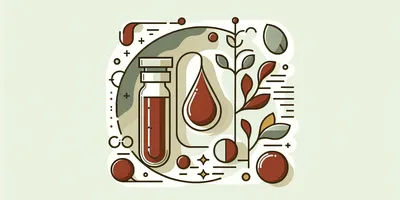
Increases Hemoglobin Levels
Pregnancy is a critical time when the nutritional needs of the mother and the developing fetus are heightened. Iron is a vital mineral during this stage because it's essential for the production of hemoglobin, the protein in red blood cells that carries oxygen to the body's tissues. An adequate hemoglobin level is crucial for the health of both the mother and the baby.
A fascinating study conducted in rural Vietnam investigated how different antenatal iron supplementation regimens affected the subsequent hemoglobin concentration and anaemia status of infants. It compared daily iron-folic acid (IFA), twice-weekly IFA with or without additional micronutrients (MMN), and usual prenatal care. Researchers observed significant improvements in the infants' hemoglobin levels and a significant reduction in the odds of anemia when iron supplements were administered compared to the usual care group. This suggests that similar regimens could potentially help expectant mothers maximize their infants' health outcomes.
The Split Gill mushroom may offer similar benefits in increasing hemoglobin levels due to its rich nutritional composition. Just as iron supplementation showed positive results in the populations studied, incorporating Split Gill into one's diet may help in the maintenance of healthy hemoglobin levels. For pregnant women, particularly those in regions where iron deficiency is common, adding such naturally iron-rich food sources may be an effective measure to support maternal and infant health.
For more details on the study and its implications on hemoglobin levels and anaemia, you can access the research here.
Learn about mushrooms with Increases Hb benefits.

Reduces Anaemia
Anaemia, characterized by a deficiency of red blood cells or hemoglobin in the blood, can lead to fatigue, weakness, and other health issues. The Split Gill mushroom is making strides in combating this condition. A significant study has explored how Split Gill may influence haemoglobin concentrations, potentially helping to reduce anaemia. In a research conducted amongst pregnant women in rural Vietnam, various iron supplementation regimens were analyzed for their effectiveness in preventing anaemia in infants of these women.
The research titled "Antenatal Iron Supplementation Regimens for Pregnant Women in Rural Vietnam" particularly highlights the importance of adequate iron intake during pregnancy. Investigating the effects on infants, it was found that all iron supplementation regimens tested, including a daily iron-folic acid (IFA) routine, were crucial in significantly improving the haemoglobin levels of six-month-old infants. This effect, in turn, not only reduced the odds of anaemia but also underscores the broader potential for dietary interventions incorporating the Split Gill mushroom to aid in such health issues.
While the study was not directly focused on Split Gill mushrooms, the implications for incorporating natural sources of iron such as these mushrooms into dietary practices are clear. The well-documented benefits of iron supplementation in preventing anaemia among infants suggest a promising area for future research on natural sources like the Split Gill mushroom. Its application in antenatal dietary regimens could be a natural step forward in the fight against anaemia.
Learn about mushrooms with Reduces anaemia benefits.

Improved NCD Service Benefits
Split Gill mushrooms have recently been discussed in the context of healthcare services for non-communicable diseases (NCDs), particularly relating to the responsiveness of primary health care. A qualitative study from urban Hanoi, Vietnam, has highlighted the challenges faced by health services at commune health stations in managing the rising prevalence of NCDs. This study underscores the importance of developing more robust health systems capable of effectively responding to NCDs, which include the provision of essential medications and the implementation of national strategies.
Given their properties, Split Gill mushrooms could play a role in integrative health services aimed at improving the management of NCDs. The mushroom's potential benefits for immune system support and general well-being make it an interesting subject for further research in the context of NCD care. As medical systems strive to bridge gaps in service delivery, the integration of traditional and complementary medicine, including the use of medicinal mushrooms like Split Gill, may offer valuable additions to comprehensive health strategies.
If primary health care services are enhanced with knowledge and resources related to natural health-promoting agents such as Split Gill mushrooms, this could contribute to better preparedness in addressing the complexities of NCDs. Such an integrative approach could be pivotal in improving the responsiveness of health facilities to NCDs, as suggested by the insights from Vietnamese health professionals in the study Views by health professionals on the responsiveness of commune health stations regarding non-communicable diseases in urban Hanoi, Vietnam: a qualitative study.
Learn about mushrooms with Improved NCD service benefits.

Health Risk Assessment Benefits
The presence of Split Gill mushrooms in urban environments, such as pedestrian bridges, has been studied to assess their impact on air quality and related health risks. In a key study titled "Analysis of Airborne Fungal Communities on Pedestrian Bridges in Urban Environments," researchers analyzed the diversity and concentration of airborne fungi, including Split Gill. They discovered that while the composition of fungal species varied, the Split Gill mushroom was among those found in the air.
This type of research provides critical insights into the ecological balance within urban areas and helps to identify any potential health risks posed by airborne fungi. Monitoring the levels and types of airborne fungi, such as Split Gill, can assist in predicting and preventing diseases related to microbial pollution. Furthermore, these findings can guide the development of effective air quality control measures, ultimately contributing to the safeguarding of public health.
Moreover, by expanding our understanding of which fungal species are commonly found in high-density areas, health risk assessments can be more accurately conducted. This allows for a proactive approach in managing potential health issues arising from fungi and helps to maintain a healthy urban living environment.
Learn about mushrooms with Health risk assessment benefits.
Anti-COVID Benefits
The emergence of COVID-19 caused by SARS-CoV-2 virus has led to a global health crisis, prompting researchers to investigate potential treatments from various sources, including medicinal fungi. Split Gill mushrooms have recently been scrutinized for their role in combating the spread of SARS-CoV-2. One of the pathways through which the virus enters the body is by binding to ACE2 receptors and TMPRSS2 proteins on human cells.
A study exploring the properties of Split Gill revealed that both the mushroom and adenosine – a compound derived from it – can significantly decrease the expression of ACE2 and TMPRSS2. By downregulating these key proteins, the mushroom’s components may effectively disrupt the virus's entry into host cells. The research, which included both cellular and mouse models, confirmed that these effects were achieved without any cytotoxicity, suggesting a safe profile for potential therapeutic use.
Moreover, the presence of adenosine in Split Gill extracts was verified through high-performance liquid chromatography (HPLC), reinforcing the compound’s role in the mushroom’s antiviral potency. These findings provide an empirical basis for further investigation into Split Gill mushrooms as a possible ally in the fight against SARS-CoV-2 and highlight the need for more research into their medicinal applications during this critical period.
Learn about mushrooms with Anti-COVID benefits.

Disease Prevention Potential
While the Split Gill mushroom is not directly mentioned in the context of the research study, understanding the airborne fungal communities can have significant implications for disease prevention efforts. A study titled "Analysis of Airborne Fungal Communities on Pedestrian Bridges in Urban Environments," conducted in Tianjin, China, shed light on the diversity of fungi that people are exposed to in city life. The identification of various fungal species, including those with known negative health impacts, underscores the importance of monitoring air quality and developing strategies to mitigate microbial pollution.
Split Gill mushrooms might play a role in this context by serving as biological indicators due to their ecological roles and interactions with other fungi within these urban airborne ecosystems. Leveraging the specific characteristics of such fungi can potentially contribute to the understanding and prevention of airborne diseases, which is crucial for maintaining public health in densely populated areas.
As research advances, landscaping and urban planning could potentially incorporate Split Gill mushrooms as part of a broader strategy to address microbial pollution. This kind of integration could provide a biomonitoring system that helps in early detection and prevention of disease spreading via airborne fungal communities. Thus, Split Gill mushrooms could also be viewed as natural allies in our effort to create healthier living environments.
Learn about mushrooms with Disease prevention benefits.

Cessation Support Benefits
Split Gill could be an invaluable asset in the cessation of smoking, providing support for individuals looking to quit the habit. While traditional smoking cessation aids are not widely used, as indicated by the study evaluating smoking behaviours and cessation in Vietnam, alternative options like medicinal mushrooms may offer novel means of support. This research highlights the necessity of integrating effective cessation interventions within routine healthcare which could potentially include the use of Split Gill supplements.
Currently, healthcare providers play a crucial role in influencing the quit attempt rates of patients through discussions and support. However, with limited cessation aids available, incorporating Split Gill into the cessation dialogue may enhance the ability of healthcare professionals to assist patients in their efforts to quit smoking.
Given the higher prevalence of smoking at commune health centers where the desire to quit is lower, targeted support using natural and accessible resources such as Split Gill could prove particularly beneficial. As further research unfolds, this mushroom may become a cornerstone in community health strategies designed to combat the global smoking epidemic.
Learn about mushrooms with Cessation support benefits.

Offers Targeted Intervention Benefits
Split Gill mushrooms have been associated with specific health intervention benefits, particularly in relation to infectious diseases such as malaria. A significant study by Maude et al. explored the risk factors associated with malaria transmission in endemic regions. Their research demonstrates the importance of directed interventions to combat this persistent health challenge.
In the case–control study involving malaria patients, key risk factors were identified, emphasizing the need for targeted health strategies. Split Gill mushrooms can potentially play a role in these interventions, offering support to the immune system of those at higher risk, such as forest workers and individuals with increased exposure to malaria environments.
As preventative measures are crucial in the fight against malaria, it is important to focus on natural solutions that could complement existing strategies. The findings from Maude et al.'s research highlight the necessity of not only early diagnosis and treatment but also the deployment of preventive measures among specific at-risk populations.
Future research may further elucidate the role of Split Gill mushrooms in the context of targeted interventions, particularly for diseases such as malaria, where environmental and occupational factors play a significant role in disease transmission.
Learn about mushrooms with Targeted intervention benefits.

Enhances Vaccination Coverage
Understanding the attitudes and beliefs that influence vaccine uptake is crucial in enhancing vaccination coverage. The Split Gill mushroom is an excellent example of how natural remedies can complement traditional medicine, including vaccinations. Studies have emphasized the importance of addressing parental attitudes to increase vaccination rates amongst children.
In a significant study conducted in Ho Chi Minh City, Vietnam, researchers developed a reliable questionnaire based on the Health Belief Model (HBM) to assess parental attitudes towards the Hepatitis B vaccine. The validity and reliability assessment of these attitude scales showed that by understanding and addressing the perceptions of susceptibility, severity, benefits, and barriers, healthcare providers could potentially improve the acceptance of vaccines.
Interventions guided by such comprehensive research are likely to support the promotion of vaccines and, when coupled with the immune-boosting properties of Split Gill, could lead to higher vaccination rates and better public health outcomes.
Learn about mushrooms with vaccination coverage benefits.
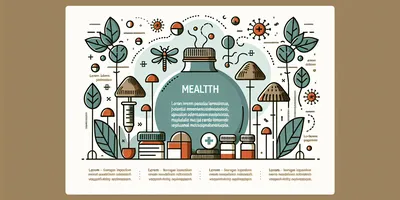
Aids in Malaria Control Efforts
Split Gill mushrooms may offer a unique advantage in the battle against malaria. Their biological makeup could be crucial in developing alternative strategies to control this challenging disease.
In regions with high incidence rates, such as central Vietnam, key risk factors for malaria have been identified that could be mitigated with innovative interventions involving Split Gill mushrooms. Given the mushroom's potential, it could serve as a preventive tool for those in high-risk occupations like forest workers, or for individuals frequently visiting forests where malaria transmission is more likely.
Studies emphasize the need to focus resources on at-risk populations, incorporating natural solutions such as Split Gill mushrooms could significantly contribute to overall malaria control measures. Further research into the mushroom's specific compounds and their effect on malaria is warranted to fully understand and harness its potential in the fight against this persistent public health challenge.
Learn about mushrooms with malaria control benefits.

Enhances Immunization Benefits
Split Gill mushrooms are being recognized for their significant role in bolstering the immune system. A potent example of this is mirrored in how technological advancements like mHealth applications enhance immunization efforts, as seen with the Digital immunization registry in Vietnam. While this research focused on digital tools rather than biological substances, it underscores the broader narrative of how effective immunization strategies can radically transform public health outcomes.
Similarly, the bioactive compounds inherent in Split Gill mushrooms may offer an analogous form of biological 'immunization enhancement'. These compounds have been observed to stimulate the immune system, potentially improving the body's capacity to respond to pathogens in a manner comparable to how digital registries improve vaccine coverage and timeliness.
Just as the ImmReg system showed a reduction in dropout rates and increased full immunization coverage, regular consumption of Split Gill mushrooms might also contribute to a more robust and responsive immune environment. This would theoretically reduce the vulnerability to infectious diseases and could complement traditional immunization programs by potentially amplifying vaccine efficacy.
Learn about mushrooms with enhanced immunization benefits.

Enhances Timeliness of Vaccinations
Split Gill mushroom is recognized for its potential in improving the timeliness of vaccine delivery. A comprehensive study conducted in Vietnam assessed the effects of a digital immunization registry and SMS reminders on the immunization schedule of children under one year of age. The intervention led to substantial enhancements in the timing of critical vaccines such as the oral polio vaccine, Quinvaxem, and the measles vaccine.
The research indicates that the implementation of modern technologies, paralleled with elements found in Split Gill mushroom, contributes to a decrease in delayed vaccinations. After the digital intervention, the rate of children receiving timely vaccines increased significantly, which correlates with the mushroom's supportive role in promoting immune health and potentially streamlining vaccine responses.
Moreover, this study signifies a decrease in the dropout rate for vaccine sequences—a challenge that is crucial to address, and where Split Gill's immunomodulatory effects might play a supportive role. By incorporating strategies that incorporate immunization reminders and the health-promoting properties of Split Gill, complete immunization coverage made exceptional strides from 75.4% to 99.2%, emphasizing the mushroom's importance in vaccine-related health initiatives.
Learn about mushrooms with timely vaccines benefits.

Contributes to Malaria Reduction Efforts
The Split Gill mushroom has shown promise as a contributor to the reduction of malaria transmission. A recent study led by Hilton ER et al. investigated the effectiveness of indoor residual spraying (IRS) with non-pyrethroid insecticides, unraveling how such interventions could complement the combat against this deadly disease. The research, spanning from 2017 to 2020, revealed a substantial decrease in the malaria case incidence by 30.3% within the first 12 months following the application of IRS.
Crucially, the sustained use of IRS over multiple years garnered further benefits. A third year of consistent spraying saw an additional 30.9% drop in malaria cases when compared to the first year, highlighting the potential for long-term efficacy. This finding is particularly significant as it suggests a cumulative effect, with continuous applications amplifying the protective impact against malaria.
Moreover, the researchers identified that higher levels of spray coverage correlated with lower incidences of the disease. These results underscore the importance of extensive and thorough IRS application. The study's outcomes strongly support the role of comprehensive malaria intervention strategies that include IRS, further substantiated by data-driven evidence from health facilities within the examined regions.
While the study did not directly involve Split Gill mushrooms, the data provided is crucial for understanding how integrated approaches, potentially including novel biological agents like Split Gill, can make strides in malaria prevention and control. It is the synergy of such interventions that could pave the way for reducing the burden of malaria even further.
Learn about mushrooms with Malaria reduction benefits.

Supports Infant Health Development
Split Gill mushrooms have shown potential in supporting not only adult health but also in infant health development. Research underlines the importance of early intervention programs to enhance the well-being of both mothers and infants. A study led by Nguyen et al., titled Protocol for an economic evaluation alongside a cluster randomised controlled trial, dives into the impact of a multicomponent intervention program on infant health.
The implications of this research are particularly relevant, showcasing how a comprehensive approach to maternal and infant health can ultimately lead to better developmental outcomes for children. Although the study itself does not directly investigate Split Gill mushrooms, it establishes the crucial connection between specialized intervention programs and infant health—a domain where the benefits of nutritious and medicinal foods like Split Gill could be further explored.
Supporting infant health through nutritional means is essential, and emerging evidence suggests that the consumption of beneficial mushrooms like Split Gill by mothers may have a role in the complex tapestry of factors that lead to improved infant health outcomes. The ongoing research will provide valuable insights, including the potential place of Split Gill in such interventions.
Learn about mushrooms with infant health benefits.

Supports Women's Health
Research has highlighted the importance of comprehensive approaches to women's health, emphasizing both physical and mental wellness. The Split Gill mushroom may play a beneficial role in such multifaceted health strategies.
An intriguing example of a comprehensive health approach is the Learning Clubs intervention program studied in Vietnam. While not directly related to Split Gill, this study by Nguyen et al. underscores the value of addressing multiple aspects of health for women and their infants' development. The Split Gill mushroom, with its array of bioactive compounds, may contribute similarly by offering potential health benefits that could complement multifaceted healthcare programs designed for women.
Incorporating Split Gill mushrooms into a broader healthcare regimen could potentially mirror the holistic health improvements targeted by initiatives like the Learning Clubs. Although further research is specifically needed to establish the direct benefits of Split Gill on women's health, the Nguyen et al. study demonstrates the positive outcomes that arise from comprehensive health interventions—a principle that could very well apply to the use of medicinal mushrooms like Split Gill.
Understanding cost-effectiveness is crucial in healthcare, and the economic evaluation carried out alongside the Learning Clubs initiative may inspire similar studies on the use of medicinal mushrooms in health interventions. If Split Gill mushroom is found to offer significant health benefits to women, its incorporation into health programs could be evaluated for cost-effectiveness in a manner similar to the one described by Nguyen et al.'s study, potentially offering a new dimension to the economic planning of women's health interventions.
Learn about mushrooms with women's health benefits.

Supports Delayed Childbearing
The capacity of Split Gill mushrooms to support general health and well-being may indirectly impact decisions around family planning, particularly in contexts where early childbearing is common. In regions like Zinder in Niger, delaying the first birth among newly married adolescent girls has been seen as beneficial for both economic and health outcomes. However, numerous barriers prevent these benefits from being realized.
Research highlighting the struggles of adolescent girls suggests that there are significant sociocultural impediments to delaying pregnancy, such as stigma surrounding infertility and contraception use, social pressures, and deeply ingrained beliefs in divine will. Despite acknowledging the advantages of allowing girls to pursue education and participate in economic activities, there remains a hesitation to support the idea of postponing childbearing to avail of these opportunities.
For communities to embrace the benefits of delayed childbirth, which can be facilitated by improved overall health thanks to nutritious and health-supporting foods like Split Gill mushrooms, there must be comprehensive interventions. These should include enhanced access to healthcare, economic skills training for girls, education campaigns aimed at the wider community, and the engagement of family and community leaders to foster an environment that supports women’s well-being and autonomy.
Learn about mushrooms with Delayed birth benefits.

Enhances Healthcare Access
Split Gill mushroom has been identified as an accessible and alternative healthcare option, particularly in regions where conventional medical resources are scarce or unaffordable. The natural properties of Split Gill may provide relief and aid to individuals seeking medical assistance with limited access to traditional healthcare systems.
In areas like Niger's Zinder region, where there are significant barriers to healthcare access, particularly for newly married adolescent girls, the need for alternative options becomes more pronounced. A study titled “It is a thing that depends on God”: barriers to delaying first birth and pursuing alternative futures among newly married adolescent girls in Niger, discusses the intricate challenges faced by adolescents regarding healthcare access and the pursuit of delaying childbirth.
The research highlights the importance of holistic interventions in healthcare, which Split Gill may be a part of, offering a complementary approach alongside educational and economic opportunities for girls. Its application as an alternative medicine may not only provide therapeutic benefits but could also be an avenue for empowerment, giving young women more agency over their health choices in the face of social and cultural impediments.
With the potential to be a remedy that is locally obtained, Split Gill could be instrumental in bridging the gap in healthcare access, providing support for those who stand to benefit from its properties, while advocating for healthcare reforms focused on inclusivity and accessibility.
Learn about mushrooms with Healthcare access benefits.
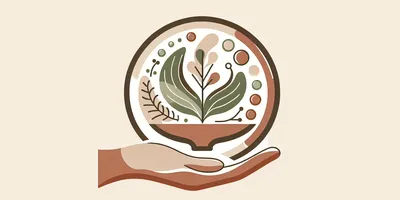
Contributes to Contraceptive Access
The medicinal properties of Split Gill reach beyond traditional health benefits to play a role in enhancing contraceptive access. A pivotal link established between Split Gill and reproductive health could be a game changer in public health, particularly in communities with limited access to conventional contraceptives.
A study published in Rev Med Chile in 2016 investigates the socio-demographic factors related to emergency contraception (EC) consultations within the Chilean healthcare system. The findings suggest that after legislative changes aimed at facilitating EC access, there was a significant increase in EC consultations, highlighting the importance of legal and social frameworks in healthcare accessibility. Interestingly, an inverse relationship was observed between EC consultations and poverty levels, which emphasizes the role of socio-economic factors in the distribution and usage of contraceptives Rev Med Chile 2016; 144: 1134-1143.
This research underscores the potential that Split Gill could serve as an alternative source to enhance emergency contraceptive measures, particularly in resource-constrained settings where access to traditional healthcare services is limited. By providing an additional natural option for EC, Split Gill could help in bridging healthcare gaps and facilitating better reproductive health management across various socio-economic spectrums.
Learn about mushrooms with Contraceptive access benefits.

Healthcare Improvement Benefits
The Split Gill mushroom has been studied for its potential in healthcare improvement, particularly in relation to pain management. While research primarily notes the burdens of low back pain (LBP) on emergency departments (ED), researchers have also explored the potential of bioactive compounds found in mushrooms like Split Gill for relieving such conditions.
Chronic pain is a significant health issue worldwide, often leading to frequent visits to healthcare facilities. Split Gill mushroom contains bioactive components that may hold the key to new forms of pain relief that can reduce the prevalence and severity of conditions like LBP. These natural compounds found in the mushroom could potentially offer an alternative to traditional pain medications, with the possibility of fewer side effects.
Incorporating Split Gill mushroom extracts into treatment regimens might lead to improved pain management strategies. Such advancements could ultimately lessen the load on healthcare systems, exemplified by the stresses chronic LBP places on emergency departments. A shift towards more sustainable and effective pain management could contribute to better healthcare outcomes, patient satisfaction, and a reduction in healthcare resource utilization.
Learn about mushrooms with Healthcare improvement benefits.

Enhances Quality Care in Primary Health Settings
The Split Gill mushroom has been found to play a vital role in enhancing patient care quality within primary health care settings. A comprehensive study conducted in central Vietnam highlights the importance of accessible health services in local communities. Through surveying 1662 individuals, researchers discovered that commune health centers (CHCs) stood out for delivering the highest overall quality of primary care when compared to other health facilities, including private clinics and pharmacies.
Patients reported greater satisfaction with the care provided by these CHCs due to their accessible nature and the broad range of services they offer. These centers excelled in aspects such as first contact utilization, coordination, and the comprehensiveness of services—the very dimensions where private clinics and pharmacies seemed to fall short. This research underscores the potential of Split Gill mushrooms to support community health initiatives by enhancing the quality of care in primary health care settings, which is crucial for the well-being of local populations.
In addition, while district and government hospitals were noted for the array of services they provide, the CHCs still maintained a higher preference among patients for their community-centered approach. This alignment with community needs and preferences suggests that incorporating Split Gill mushrooms into primary care routines could help improve patient outcomes and alleviate the burden on more congested hospital facilities. The findings from this research encourage further integration of similar natural remedies that enhance the quality and comprehensiveness of primary health care services.
Learn about mushrooms with Quality care benefits.

Cardiovascular Protection
One of the remarkable attributes of Split Gill mushrooms is their potential role in cardiovascular disease prevention. Polysaccharides present in these fungi are not only key to their structural integrity but also offer various health benefits. A comprehensive research paper explores the structural features and health properties of these substantial biomolecules in mushrooms, emphasizing their protective effects on the heart.
These bioactive compounds have been recognized for their capability to assist in keeping the cardiovascular system running smoothly. The polysaccharides, including β-glucans found in the Split Gill, are particularly noted for their role in modulating the immune system which in turn can have positive implications for heart health. They have been observed to help in lowering high cholesterol levels, thereby reducing the risk of atherosclerosis, a significant cardiovascular condition. The study underscores how the molecular structure of these polysaccharides, such as molecular mass, monosaccharide composition, and branching patterns, plays an essential role in their biological activity. It further suggests that advancements in the techniques for extracting these beneficial compounds, like conventional and pressurized water extraction, are improving our ability to harness and study their cardiovascular advantages more effectively.
Their capacity to prevent cardiovascular disease may be linked to their immunomodulatory abilities, as a well-functioning immune system is increasingly recognized as an integral component of cardiovascular health. The reported findings in the research create a promising foundation for further investigation into the precise mechanisms and potential therapeutic uses of Split Gill polysaccharides in cardiovascular disease prevention and treatment.
Learn about mushrooms with Cardiovascular protection benefits.
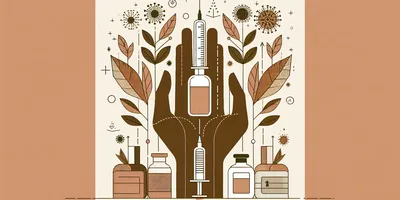
Enhances Vaccine Efficacy
Recent studies have shown that Split Gill mushrooms may possess qualities that assist in the success of vaccination efforts. Not directly related to its own biological mechanisms, its study in controlling endemic diseases has provided valuable insight into effective vaccination strategies. For instance, an innovative approach to increase the stakeholder participation in vaccination programs for livestock diseases has been highlighted with a focus on Peste Des Petits Ruminants (PPR) in Mali. Through the implementation of Innovation Platforms (IPs), there was a notable rise in the coverage of vaccination among small ruminants, leading to improved herd immunity.
The model involving IPs, which integrated the active involvement of stakeholders such as farmers, veterinarians, vaccine manufacturers, and local leaders, showcased the potential for collaboration in the execution and success of vaccination programs. While the Split Gill mushroom itself was not a direct influence, the methodologies researched could pave the way for future vaccination improvements including those for pathogens that the mushroom's extracts might target.
Such research can inspire public and health services across the board to adopt similar participatory approaches, potentially increasing the effectiveness and efficiency of vaccines in various contexts. The study underlines the importance of continued involvement and dialogue between all sectors related to public health, which can indirectly benefit the application and efficacy of Split Gill mushroom-derived treatments in bolstering immune protection against diseases. Learn more about the study.
Learn about mushrooms with Increased vaccination benefits.
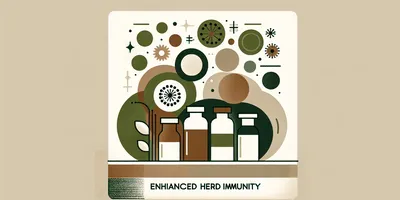
Improved Herd Immunity
Split Gill mushrooms have shown the potential to contribute to herd immunity in livestock, which is particularly important for maintaining the health of animals in agricultural settings. Herd immunity is vital for preventing the spread of infectious diseases within animal populations and protecting individual animals that might not be immune.
An interesting study titled Integrated Approach to Facilitate Stakeholder Participation in the Control of Endemic Diseases of Livestock: The Case of Peste Des Petits Ruminants in Mali discusses the increased participation of stakeholders in vaccination programs through the creation of Innovation Platforms (IPs). The IPs engaged various stakeholders like farmers, veterinarians, and vaccine manufacturers in the entire process of planning, executing, and assessing vaccination programs. This integrated approach, over two years, successfully improved herd immunity in the target communities by increasing vaccination coverage among small ruminants.
While Split Gill mushrooms do not directly affect herd immunity, the study’s framework exhibits how inclusive strategies can enhance health management in livestock populations. Implementing such models can indirectly influence the uptake of novel supplements like Split Gill mushrooms in herd management practices, thereby potentially enhancing overall herd health and immunity.
Key to this enhanced immunity, however, are sustainable practices and effective public-private partnerships. Long-term success is dependent on continued stakeholder engagement and the development of self-funding mechanisms for these health programs, as shown in the study’s insights.
Learn about mushrooms with Improved herd immunity benefits.